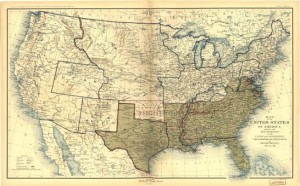 While in Virginia the North and South struggle over control of Petersburg–and hence the Confederate capital of Richmond–numerous minor skirmishes take place this summer throughout Virginia at large.
While in Virginia the North and South struggle over control of Petersburg–and hence the Confederate capital of Richmond–numerous minor skirmishes take place this summer throughout Virginia at large.
One such clash occurs today when Confederate Col. John S. Mosby’s Rangers (or Raiders), a crack cavalry unit, attack 150 Union cavalrymen near the Mt. Zion Old School Baptist Church in Loudoun County. Mosby squares off against the 2nd Massachusetts Cavalry and the 13th New York Cavalry.
True to their fierce reputation, Mosby’s Rangers easily dispatch the enemy, killing some 100 Federal soldiers in the process, while only one Confederate is killed. The small victory is welcome news to a beleaguered Confederacy.
A number of those killed in action today are eventually buried in a graveyard near the Baptist church.
Even as many white Southerners rest their hopes on daring exploits such as those of Mosby’s Rangers, Southern Baptist newspapers routinely remind their readers that Confederate victory over the abolitionist North is safely in the hands of a higher power … a power mightier even than General Robert E. Lee.The latest such reminder appears in today’s edition of the North Carolina Baptist Biblical Recorder.
We need to be continually reminded that we must look to God for success in this war; for [we] are constantly in danger of looking rather to human strength, to our armies or our Generals. The Richmond correspondent of one of our exchanges cautions us against the error, in the following beautiful and forcible language:
“But I find that I am falling into the error so common in the army, and indeed in the whole country. All of us, including the highest officers as well as the humblest privates, have come to look up to Gen Lee with the most implicit faith and confidence, and to believe that the path he treads must surely lead to victory. This feeling is increased, if not justified, when we recollect how quietly and successfully he penetrated Grant‘s designs and anticipated him at the Wilderness, and especially when we recall the almost supernal prescience which enabled him to foresee and provide against the advance of the Federal army upon this place. The ease with which he unravels the most intricate combinations of his antagonist, the intuitive knowledge which he seems to possess of all his plans and designs, and the certainty with which he moves his own army and makes his own dispositions, is truly wonderful. But good and great as our chief is, there is a greater power than he–a power upon whom he leans as the army leans upon him, or a child upon a father; and one must sometimes tremble lest we be guilty of the monstrous crime of diverting from that beneficent power the love and gratitude which are so justly due for the good fortune that has literally been showered upon our cause and country since the dawn of this blessed year of 1864.–When we recall the disasters which attended our armies last year, the gloom during the winter, the miraculous inspiration that descended upon the army and extended through the country, as the year unfolded its monthly leaves, and the series of brilliant and substantial and unexpected victories that crowned our arms in rapid and almost bewildering succession, in every part of the country, it would seem impossible for any son or daughter of this stricken land, either Jew or Gentile, Pagan or Christian, to rise from the contemplation, except with a heart swelling with gratitude, and eyes brimming with tears of joy. Heaven has been kind in giving us such leaders and such armies, but kinder still in leading them in the path of victory.”
Should the casual reader, unencumbered with the facts on the ground, read such cheerful and lofty rhetoric, he could readily be forgiven for believing that Yankee soldiers are no where to be found in the hallowed, and victorious, Confederacy.
Sources: John S. Mosby (link); “Zion Baptist Church,” Historical Marker Database (link); “Where to Look for Deliverance,” Biblical Recorder, July 6, 1864 (link)


